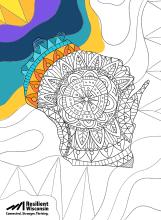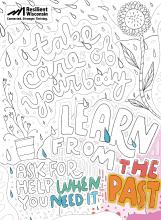Resilient Wisconsin
We all experience ups and downs in life. Feelings of loss or worry. A serious health or relationship problem. Stress at work or substance use in the home. Even natural disasters and large-scale emergencies.
Difficulties in life can make it hard to take care of yourself and the people around you. Learning ways to cope with, and recover from, tough times is how we build resilience. Without it, we can become overwhelmed by trauma, toxic stress, and other issues.
There are many types of resilience.
- Physical resilience helps our bodies overcome physical health challenges. It helps us bounce back from sickness or accidents. It can also help us manage or heal ongoing physical health issues.
- Mental resilience helps us work through tough times by developing problem-solving skills.
- Emotional resilience helps us respond to challenges that bring about negative feelings or emotions like anger, fear, vulnerability, or sadness.
- Social resilience gives us the ability to connect with those in our lives and communities so we can support each other through challenging times.
Strategies for building resilience
These resilience-building practices can help you learn to adapt and recover in the face of adversity.
- Lean on healthy relationships: Build a supportive network of people who care about you and spend quality time (even if virtually) with them.
- Take care of your body: It’s easier to maintain your mental and emotional health when you feel good. Make an effort to eat well, get enough sleep, and exercise.
- Avoid harmful behaviors: Look for healthy ways to deal with difficult emotions. Trying to escape these emotions through substance use will create more stress.
- Take charge: We can’t always control our circumstances, but we can control our response. Break problems into manageable tasks and move forward.
- Check in with your feelings: When stressful events occur, it’s important to take a step back and reflect before we react. It helps to understand where your emotions are coming from before you share them.
- Learn from the past: Recognize who or what was helpful (or unhelpful) the last time you were in a stressful situation. Remembering past challenges can help you overcome new ones.
- Ask for help when you need it: Reaching out to family or friends, a health care professional, or a community resource isn’t easy, but knowing how to accept help is a sign of strength.
Help the helper training
When you dedicate your life to the care of others, it’s easy to sacrifice your own health and well-being. Learn how to build resilience to live a happier, healthier life by watching the video below. Complete this short survey to receive a certificate of completion for watching the help the helper training.
First responder training
Emergency medical services professionals, firefighters, and law enforcement officers are invited to watch the video below. It provides information on how to recognize the symptoms and risks associated with toxic stress and tools for self-care to improve mental and physical health. Complete this short survey to receive a certificate of completion for watching the first responder training.
Resource: Toolkit for first responders (PDF)
Coloring pages
Taking time to relax, reflect, and do something fun (like coloring!) can help people of all ages build resiliency.
Live Your Best Life, P-02979 (PDF)
Opportunities for better health are all around you. Explore them everywhere you live, work, and play to live a full life.
Unleash You Inner Strength, P-02980 (PDF)
People are stronger than people know. The power to recover from setbacks, adapt to change, and overcome life’s challenges is within you.
Need a break? It's natural, P-02981 (PDF)
Keep the outdoors in mind when wanting to relax and recharge. Spending time in nature is a great way to get active and improve your mood.
Take Care of Your Whole Self, P-02982 (PDF)
Good health happens in our bodies and minds, and in our actions and relationships. Take care of your whole health for a better life.
Care Goes the Distance, P-02983 (PDF)
Staying connected to the people who matter most is important.
Where you can reach out for help and support
It’s important to know that you’re never alone when facing hard times. Free help and support are always within reach. Asking for help and support is a great step towards building resilience.





